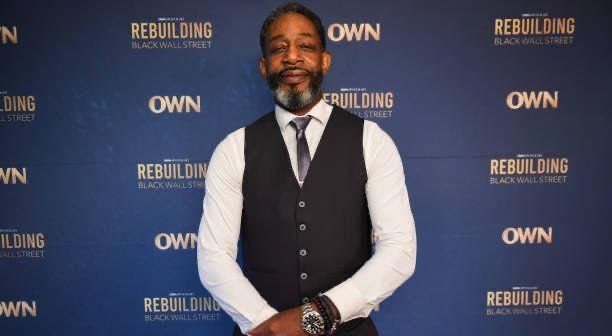Edgard native pioneers revival efforts for Black Wall Street
Published 10:51 am Tuesday, October 3, 2023
|
Getting your Trinity Audio player ready...
|
From growing up in St. John Parish, to becoming a pioneer of the tech world, Lael’s Alexander path led him to an unexpected role as a champion for Black Wall Street’s revival. Now, as the world tunes in to OWN’s “Rebuilding Black Wall Street,” we uncover the remarkable story of his commitment to revitalizing the Greenwood District of Tulsa, Oklahoma.
Lael Alexander, an Edgard native and the mastermind behind the groundbreaking technology of Miracast, which allows screen sharing from mobile devices to televisions, has emerged as a key figure in the revival of the historic Black Wall Street.
His remarkable journey from St. John the Baptist Parish to the global tech industry and back to the United States is a testament to innovation, resilience, and a commitment to rebuilding the vibrant legacy of Black Wall Street.
Trending
In 2009, Alexander transitioned from the oil and gas industry into the tech sector. His pioneering work brought him to Texas, where his innovative computer designs garnered attention and recognition. One pivotal invention was the creation of the first smart computing device and ILT device that enabled utility companies to monitor the condition of pole top transformers.
Alexander’s innovation directly addressed the issue of blackouts and brownouts during storms, a common problem in Louisiana and other areas. His technology enabled utility companies to proactively identify transformer wear and tear, reducing reliance on community reports.
Despite offers from major tech corporations, Alexander chose to remain independent and embarked on a transformative journey to China. In partnership with a large investment firm from China, he founded Siecom Communications and Technology Co, Ltd in 2012, China’s largest Original Design House and Manufacturing firm (ODM). Under his leadership, Siecom became responsible for designing approximately 38% of the world’s mobile phones.
“I was China’s and the Asian market’s top designer of all things consumer electronics,” Alexander said. “So the things that you have in your kitchen, appliances, all the things with cool designs that plug in the wall. If it said Alcatel, TCL, RCA or Sony Xperia, Lael Alexander designed it.”
While in China from 2012 to 2016, Alexander solidified his reputation as the top designer of consumer electronics in Asia. His accomplishments in the tech industry earned him numerous industry awards.
However, Alexander’s journey took a dramatic turn in 2017 when he suffered a life-threatening accident while mountain climbing in China. Initially facing the prospect of losing his arm, he decided to return to the United States to seek medical treatment. On the flight home, he experienced complications from blood clots, leading to congestive heart failure. His medical journey included multiple surgeries, three stents in his heart, and extensive arm reconstruction.
Trending
Remarkably, even during this challenging year, Alexander continued to receive industry accolades, winning three major awards.
In 2017, Alexander made a pivotal decision to return to the United States. His rediscovery of the story of Black Wall Street in Tulsa inspired a new mission: to relocate his extensive factory operations from China to Tulsa and contribute to the economic revitalization of the Greenwood District.
Alexander’s return to Tulsa led to an influx of international visitors and an increase in international travel to the city, further fueling his commitment to the area. He strategically acquired properties, including the last remaining 10 acres of Black Wall Street, which will house manufacturing facilities spanning 170,000 square feet. In total, he has developed four manufacturing sites within three years, with commissioning and the balance of plant scheduled for February 19, 2024. These efforts are expected to create nearly 1,300 jobs in the Tulsa market.
In addition to establishing manufacturing facilities, Alexander has co-founded a venture network called “Minority Startups,” aimed at investing in small tech companies and entrepreneurs seeking to contribute to America’s growth and innovation.
Alexander’s mission extends beyond the physical revival of Black Wall Street. He envisions it as a symbol of opportunity and prosperity for all minorities and individuals who have been historically underrepresented.
“It’s not about a Black Wall Street to me. Black Wall Street is not a GPS location,” Alexander said. “Black Wall Street, for many minorities, is a frame of mind that says you, too, have the opportunity to exist in this vibrant economy. You just have to have access to it.”
Throughout his journey, Lael Alexander has invested nearly $8 million in the redevelopment of Tulsa’s Black Wall Street, with plans for further investment totaling $86 million.
Alexander’s story and commitment to rekindling the spirit of a community captured the attention of the Oprah Winfrey Network (OWN), leading to the creation of the show “Rebuilding Black Wall Street,” produced by Sunwise Media with Ri-Karlo Handy and Karra Duncan, a Tulsa Race Massacre descendent, serving as executive producers.
“That was crazy. Ri-Karlo and I, we’ve become great friends,” Alexander said. “With all of the excitement that we had stirred up over the past four years, we knew that the news was going to come. But I didn’t know how, to be honest with you, because it wasn’t planned.”
The show, which premiered on Sept. 29, will span six captivating episodes.
“Rebuilding Black Wall Street” will showcase a compelling array of stories from the season, including Montika Collins, a descendant of the Tulsa Race Massacre, who aspires to establish North Tulsa’s sole natural birthing center and revive the tradition of midwifery within the Greenwood District. Designers Jon Pierre and Mary will join forces to support her vision.
In the episode “The Family House,” Rachel Walker, another Tulsa massacre descendant, will work to preserve her ancestral home with the help of the nonprofit 1256 Movement. The renovation of her kitchen will shed light on the history of homeownership in Tulsa.
These stories, among others featured throughout the series, will all center around the revitalization of the Greenwood District and Black Wall Street, with Alexander offering his inventions to community leaders.
“As a kid growing up in Edgard on the West Bank, we always heard the term Black Wall Street,” Alexander said. “As a child, I used to envision, wow, there’s a Wall Street for people like me too? So to be the tip of the spear at reinstating this, not just for Blacks, but for the women in business and for all of the other individuals that have been either misrepresented or non represented, I stand here.”
Alexander had a watch party with the producers of the show for the series premiere on Sept. 29.
“We had a good time, and we’re planning on doing a lot of viewing parties,” Alexander said.
Alexander returns to his hometown of Edgard, Louisiana this week for the West St. John class reunion and another viewing party.






